 W
WThe giant antshrike is a species of bird in the family Thamnophilidae, belonging to the monotypic genus Batara. It is found in the southern Yungas, western Paraguay and the southern Atlantic Forest. This species is the largest species of antbird, measuring 34 cm long and weighing around 150 g.
 W
WThe rufous-capped antshrike is a species of bird in the family Thamnophilidae. It is found in Argentina, Bolivia, Brazil, Paraguay, Peru, and Uruguay. Its natural habitats are subtropical or tropical moist montane forests, subtropical or tropical moist shrubland, and subtropical or tropical high-altitude shrubland.
 W
WThe versicolored barbet is a very colorful species of bird in the family Capitonidae. The species is also known as the blue-moustached barbet. It is found in humid Yungas forest growing on the east Andean slopes in Peru and Bolivia.
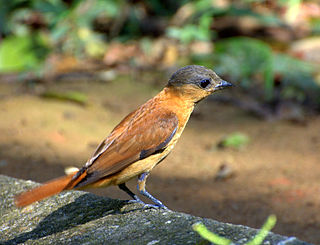 W
WThe crested becard, also known as the plain becard, is a species of bird in the family Tityridae. It has traditionally been placed in Cotingidae or Tyrannidae, but evidence strongly suggest it is better placed in Tityridae, where it is now placed by the South American Classification Committee.
 W
WThe yellow-billed cacique is a species of cacique in the family Icteridae. It is monotypic within the genus Amblycercus. There is some question as to whether or not it is a true cacique.
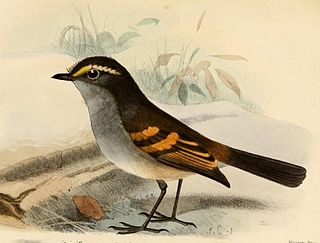 W
WThe golden-browed chat-tyrant is a species of passerine bird in the family Tyrannidae. It is found in the Yungas of Peru and Bolivia.
 W
WThe olive-crowned crescentchest is a species of bird in the family Melanopareiidae. It is found in Argentina, Bolivia and Paraguay.
 W
WThe horned curassow, or southern helmeted curassow, is a species of bird in the family Cracidae found in humid tropical and subtropical forests. It was first described by James Bond and Rodolphe Meyer de Schauensee in 1939 from a specimen collected in Bolivia, and further birds that were described from Peru in 1971 were thought to be a new subspecies. However, the taxonomical position of the birds found in Peru in 1971 is unclear. The horned curassow as originally described is endemic to Bolivia. It is a large, predominantly black bird with a distinctive casque on its forehead. It is an uncommon bird with a limited range and is suffering from habitat loss, and the International Union for Conservation of Nature has rated its conservation status as being "critically endangered".
 W
WThe rusty-browed warbling finch is a species of bird in the family Thraupidae. It is found in Argentina and Bolivia. Its natural habitat is subtropical or tropical moist montane forests.
 W
WThe stripe-tailed yellow finch is a species of bird in the family Thraupidae. It is found in Argentina, Bolivia, Brazil, Colombia, Guyana, Paraguay, Peru, Suriname, and Venezuela. Its natural habitats are dry savanna and pastureland.
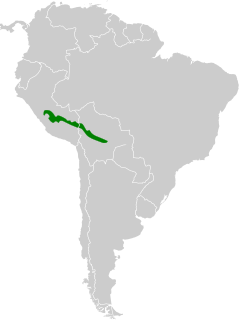 W
WThe white-browed hermit is a species of hummingbird in the family Trochilidae. It is found in the Andean foothills and adjacent lowlands in Bolivia and Peru. Its natural habitat is subtropical or tropical moist lowland forest.
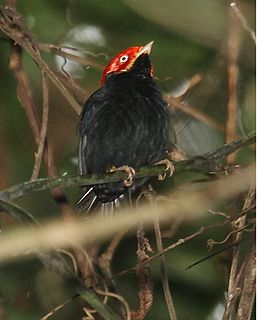 W
WThe round-tailed manakin is a species of bird in the family Pipridae. It is found in Bolivia, Brazil, and Peru. Its natural habitats are subtropical or tropical moist lowland forest and subtropical or tropical moist montane forest.
 W
WThe Yungas manakin is a species of bird in the family Pipridae. It closely resembles the blue-backed manakin, but unlike that species it has dull dark red legs and is found in humid highland forests in the Yungas of southeastern Peru and Bolivia.
 W
WThe lyre-tailed nightjar is a species of nightjar in the family Caprimulgidae. It is found in Argentina, Bolivia, Colombia, Ecuador, Peru, and Venezuela.
 W
WThe dusky-green oropendola is a species of bird in the family Icteridae. It is found on the eastern slope of the Andes in Bolivia and Peru. Its natural habitats are subtropical or tropical moist montane forests and heavily degraded former forest.
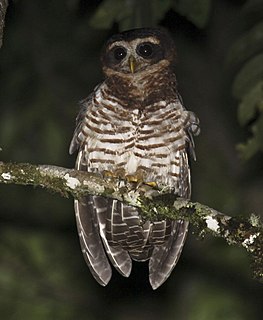 W
WThe band-bellied owl is a species of owl in the family Strigidae. It is found in Bolivia, Colombia, Ecuador and Peru.
 W
WThe Yungas pygmy owl, is a species of owl in the family Strigidae. It is found in Bolivia, Peru, and possibly in Argentina. Its natural habitat is subtropical or tropical moist montane forest.
 W
WThe mitred parakeet, also known as the mitred conure in aviculture, is a species of green and red parrot in the family Psittacidae. It is native to the forests and woodlands in the Andes from north-central Peru, south through Bolivia, to north-western Argentina, with introduced populations in California, Florida and Hawaii. It may constitute a cryptic species complex.
 W
WThe blue-capped puffleg is a species of hummingbird in the family Trochilidae. It is found in Argentina and Bolivia. Its natural habitats are subtropical or tropical moist montane forest and heavily degraded former forest.
 W
WThe black-goggled tanager is a species of bird in the family, Thraupidae. It is the only member of the genus Trichothraupis. It is found at low levels in forest and woodland in a large part of eastern and southern Brazil, eastern Paraguay and far north-eastern Argentina, with a disjunct population along the East Andean slope in Peru, Bolivia and far north-western Argentina. While generally common and widespread, and consequently considered to be of least concern by BirdLife International and IUCN, the population associated with the Andes is relatively local and uncommon.
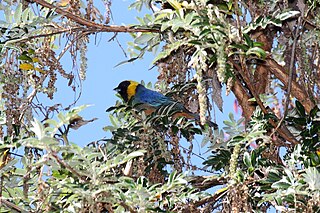 W
WThe golden-collared tanager is a species of bird in the family Thraupidae. It is found in Bolivia and Peru. Its natural habitat is subtropical or tropical moist montane forests.
 W
WThe rust-and-yellow tanager is a species of bird in the family Thraupidae. It is found in Argentina, Bolivia, and Peru. Its natural habitats are subtropical or tropical moist montane forests and heavily degraded former forest.
 W
WThe slaty tanager is a species of bird in the family Thraupidae. It is found in Bolivia and Peru. Its natural habitat is subtropical or tropical moist montane forests.
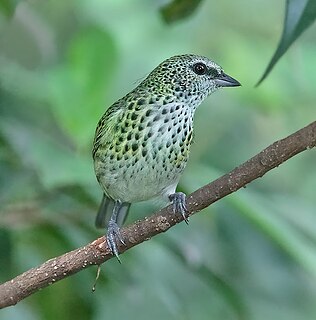 W
WThe spotted tanager is a species of bird in the tanager family Thraupidae. It is found in Bolivia, Brazil, Ecuador, French Guiana, Guyana, Peru, Suriname, and Venezuela. Its natural habitats are subtropical or tropical moist lowland forests and subtropical or tropical moist montane forests.
 W
WThe Andean slaty thrush is a species of bird in the family Turdidae.
 W
WThe ochre-faced tody-flycatcher is a species of bird in the family Tyrannidae.
 W
WThe cinnamon-faced tyrannulet is a species of bird in the family Tyrannidae. It is found in the Yungas of Peru and Bolivia. First described in 1997, it was named in honor of Theodore A. Parker III.
 W
WThe mottle-cheeked tyrannulet is a generally common, small species of bird in the family Tyrannidae. It occurs in two disjunct populations, one associated with montane Atlantic Forest in south-eastern Brazil, eastern Paraguay, north-eastern Argentina and Uruguay, and another found in forest growing on the east Andean slope in Peru, Bolivia and north-western Argentina. A very active bird usually seen with its tail held cocked.
 W
WThe rough-legged tyrannulet is a species of bird in the family Tyrannidae. It is found in Argentina, Bolivia, Brazil, Colombia, Costa Rica, Ecuador, Panama, Paraguay, Peru, and Venezuela. Its natural habitats are subtropical or tropical moist lowland forest and subtropical or tropical moist montane forest.
 W
WSclater's tyrannulet is a species of bird in the family Tyrannidae. It is found in Argentina, Bolivia, and Peru. Its natural habitats are subtropical or tropical moist montane forests and heavily degraded former forest.
 W
WThe plumbeous tyrant is a species of bird in the family Tyrannidae. It is found in southeastern Peru, western Bolivia and northern Argentina. Its natural habitat is subtropical or tropical moist montane forests. This and the Jelski's black tyrant are sometimes considered conspecific, in which case, the bird is then usually referred to as the Andean tyrant.
 W
WThe golden-bellied warbler is a South American species of bird in the family Parulidae. Its natural habitats are subtropical or tropical moist lowland forests, subtropical or tropical moist montane forests, and heavily degraded former forest.
 W
WThe riverbank warbler, sometimes known as the Neotropical river warbler or just river warbler, is a species of bird in the family Parulidae.
 W
WThe two-banded warbler is a species of bird in the family Parulidae. It is found in Argentina, Bolivia, Brazil, Guyana, Peru, and Venezuela. Its natural habitats are subtropical or tropical moist montane forests and heavily degraded former forest.
 W
WThe brown-capped whitestart or brown-capped redstart is a species of bird in the family Parulidae. It is found in humid Andean forests and woodlands in Bolivia and north-western Argentina. It sometimes includes the tepui whitestart as a subspecies.
 W
WThe dot-fronted woodpecker is a species of bird in the family Picidae. It is found in Argentina and Bolivia. Its natural habitats are subtropical or tropical dry forests and subtropical or tropical moist montane forests.
 W
WThe Yungas dove, also known as the white-faced dove or large-tailed dove, is a species of bird in the family Columbidae.